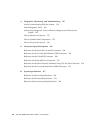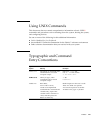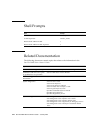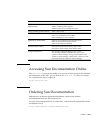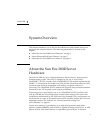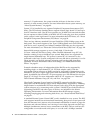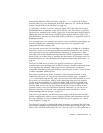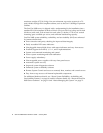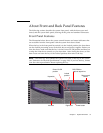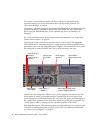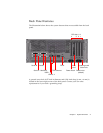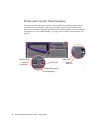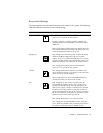
2 Sun Fire 280R Server Owner’s Guide • January 2001
memory I/O performance, the system transfers 64 bytes of data into or from
memory on each memory transfer. For more information about system memory, see
“About System Memory” on page 80.
System I/O is handled by two separate Peripheral Component Interconnect (PCI)
buses. The PCI industry-standard buses support all main logic board I/O and up to
four PCI interface cards. One PCI bus operates at a 33-MHz clock rate and the other
bus can operate at either 33 MHz or 66 MHz. All PCI cards plug in to slots provided
on the system’s main logic board. For more information about PCI buses, see “About
Peripheral Component Interconnect (PCI) Buses” on page 84.
There are four industry-standard Universal Serial Bus (USB) 12-Mbps ports on the
back panel. The system supports a Sun Type 6 USB keyboard and a Sun USB mouse;
each device uses a separate port. Industry-standard USB hubs are also supported.
For more information, see “About the Universal Serial Bus (USB) Ports” on page 102.
Internal disk storage supports up to two 1-inch high, 3.5-inch wide
(2.54-cm x 8.89-cm) disk drives using a Fibre Channel-Arbitrated Loop (FC-AL)
interface running at up to 106 Mbytes per second. Both drives are supported in a
single internal arbitrated loop. The system’s external FC-AL connector is also
connected to the loop. Systems configured with two disk drives (currently 18- or 36-
Gbyte capacity) can provide software mirroring and hot-pluggable boot drive
capability. For more information about disk storage, see “About Internal Disk
Drives” on page 91.
External redundant arrays of independent disks (RAID) can be supported by
installing single- or dual-channel FC-AL PCI host adapter card(s) with the
appropriate system software; or RAID can also be supported by connection to the
external FC-AL port’s copper high-speed serial data connector (HSSDC) on the back
panel. In addition, the external FC-AL port supports up to 125 different devices (per
single FC-AL loop). For more information about FC-AL support, see “About the
Fibre Channel-Arbitrated Loop (FC-AL) and Port” on page 104.
Ultra Small Computer System Interface (UltraSCSI) external multi-disk storage
subsystems and RAID storage arrays can be independently supported by installing
single-channel or multichannel PCI host adapter cards, along with the appropriate
system software; or by connecting to the system’s UltraSCSI port. Software drivers
supporting UltraSCSI, and other types of devices, are included in the Solaris
Operating Environment. For more information about RAID storage support,
including hot-plugging and mirroring disk drives, see “About Internal Disk Drives”
on page 91.
A standard Remote System Control (RSC) card is installed in every system. The RSC
card supports internal host environmental monitoring; host power-on and power-off
from the firmware level; remote or local automatic notification via email or pager for
hardware and software failures; and viewing of server boot logs and run-time logs.
Multiple simultaneous remote access connections to the RSC card on each host are
configurable over modem and serial ports, or over the card’s 10-Mbps standard



